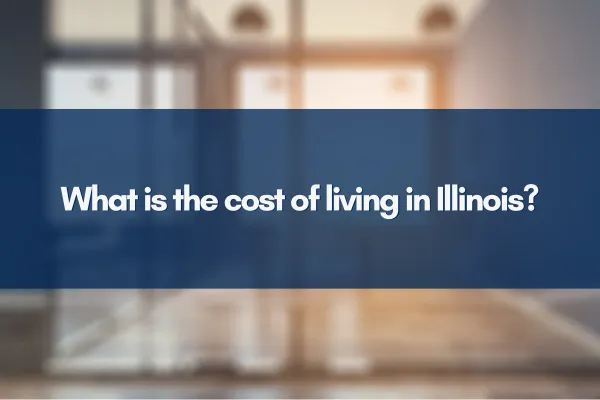How Much Is Your Home Worth?

What is the cost of living in Illinois?
What is the Cost of Living in Illinois?
Picture this: You’re about to take the plunge and move to Illinois. Maybe you’re drawn by the vibrant energy of Chicago, IL, or perhaps you prefer the quieter rhythms of smaller towns like Peoria or Springfield. But before packing your bags, there’s one burning question: Is Illinois expensive to live in?
This isn’t just idle curiosity — it’s a smart, informed question worth dissecting if you want to stretch your paycheck without giving up your favorite latte or weekend adventure.
Let’s dive into the nitty-gritty of Illinois' cost of living.
Illinois: A Snapshot of Affordability
Living in Illinois blends a variety of costs: housing, transportation, groceries, utilities, and more. When you ask if Illinois is expensive, you're really asking about your budget compared to what you get in return.
According to recent data, Illinois scores a cost of living index around 98 (U.S. average = 100). What does that mean?
It’s slightly less expensive than the national average, making Illinois a pretty balanced state for affordability.
However, this varies widely between urban hubs like Chicago and more rural or suburban areas.
Chicago, IL: The Urban Cost Factor
If Illinois were a movie, Chicago would be the big-budget blockbuster — vibrant, fast-paced, and yes, costlier. The cost of living here is roughly 20% higher than the Illinois average due to higher rents, transportation, and entertainment costs.
Housing reigns supreme as the biggest slice of your budget pie. Marching through a month’s rent in downtown Chicago can cost upwards of $1,800 for a one-bedroom apartment.
Outside the city center? Costs drop to around $1,200 - $1,400 — still not cheap, but considerably lighter on your wallet.
Utilities in Chicago can run about $135 monthly, slightly above the national average because of seasonal swings in heating and cooling.
Transportation options abound, from the CTA trains and buses to ride-shares, but commuting expenses add up. The average Chicagoan spends about $100-$130 monthly on public transit passes.
Why Is Illinois Not Just About Chicago?
Here’s the plot twist: Outside Chicago, you get way more bang for your buck.
Cities like Peoria, Bloomington, and Rockford feature housing costs that can be 40-60% cheaper than Chicago’s. Utilities and transportation are also more affordable, balancing lifestyles between city rush and suburban calm.
What About Groceries and Other Essentials?
Groceries in Illinois hover near the national average. You can expect to pay:
$3.50 for a gallon of milk
$2.20 for a loaf of bread
$0.99 for a dozen eggs
Eating out? A typical meal at an inexpensive restaurant costs around $15—reasonable for those date nights or quick lunches.
Utilities and Healthcare: The Less Flashy But Important Costs
Utilities encompass electricity, water, heating, and garbage. Illinois’ colder winters can crank up heating bills in winter months, but overall, the monthly utility cost averages near $130.
Healthcare costs in Illinois are just about average nationwide. Remember, healthcare costs vary widely based on age, insurance plans, and personal health needs, so keep that in mind.
How Does Illinois Compare Nationally?
If you were intrigued by phrases like “Is Illinois expensive to live in?” it helps to have context. For instance:
Illinois is cheaper than coastal states like California or New York. If you’ve eyed moving from Los Angeles or NYC, your dollar will likely stretch further here.
On the flip side, Illinois is more expensive than some Midwest states like Indiana or Missouri but balances that with more amenities and economic opportunities.
Breaking the Myth: “Is Illinois Expensive to Live In?”
Quick Takeaways
Illinois overall is moderately priced compared to the national average. It’s not the cheapest state, but it also doesn’t demand luxury prices (unless you choose the downtown Chicago life!).
Chicago, IL is the priciest spot in Illinois but still reasonable compared to cities like New York or San Francisco.
Smaller cities and suburban areas offer great affordability. Think attractive living costs without sacrificing city conveniences.
Utilities and groceries are close to national averages, but winter heating costs add a seasonal spike especially outside Chicago.
Transportation costs vary — plentiful public transit in Chicago, but car ownership costs can add up in more spread-out towns.
Case Study Snapshot: Renting in Chicago vs. Peoria
Chicago (Downtown, 1-Bedroom Apartment): $1,850/month
Peoria (1-Bedroom Apartment): $750/month
Monthly Public Transportation Chicago: $105
Car Ownership/Commute Peoria: ~$150-$200 (gas + insurance)
Clearly, location shapes the cost, but your lifestyle preferences and commuting choices matter too.
Your Cost of Living Calculator for Illinois — A Quick Guide
Want to personalize this? You can use the RentCafe Cost of Living Calculator here to compare your current city and projected Illinois location.
Try inputting:
Your current rent or mortgage
Estimated utilities
Transport expenses
Grocery & dining habits
It’s a quick tool to empower your budgeting decisions.
FAQs: Illinois Cost of Living
Q1: Is Chicago, IL the most expensive part of Illinois?
A: Yes, the urban core of Chicago tends to be the priciest in terms of rent, dining, and entertainment.
Q2: Are utilities expensive in Illinois?
A: Utilities are generally around the national average but can spike in colder months due to heating needs.
Q3: How affordable is housing outside Chicago?
A: Much more affordable! Many smaller cities offer rents 40-60% less than Chicago’s prices.
Q4: Will I save money by moving to Illinois from a coastal city?
A: Most likely yes, especially compared to New York, San Francisco, and Los Angeles, where living costs are substantially higher.
A Thought to Ponder: Your Move to Illinois
Moving is a big leap — not unlike launching a game-changing Apple product back in the ‘80s. You want to marry innovation with affordability. Illinois offers that harmonious blend, whether you’re a city slicker enjoying Chicago’s beats or a suburbanite chasing space and savings.
Your wallet and lifestyle both deserve a thoughtful balance. When you get the cost dynamics right, it frees you to pursue your dreams without constantly watching your bank balance—with less stress and a bit more fun.
If you’re ready to explore real estate options and want deeper insights on what fits your budget and lifestyle in Illinois — especially Chicago or its surrounding areas — get in touch!
📞 Contact: Sohail Salahuddin
📍 Title: Real Estate Broker
📲 Phone: 312-818-2978
📧 Email: [email protected]
🌐 Website: https://sohailrealestate.com
Let's turn your Illinois living dreams into an affordable reality. Questions, comments, or stories to share? Drop a line below or share this post with someone thinking about their next move!
References:
RentCafe Cost of Living Calculator: https://www.rentcafe.com/cost-of-living-calculator/us/il/
U.S. Bureau of Economic Analysis and National Cost of Living Data
Thanks for reading — and remember, knowing more about costs means living smarter tomorrow!




